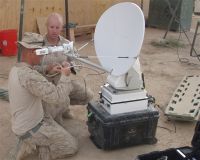WASHINGTON, Feb. 4, 2011 — Deployed service members often count on connections home — whether it’s e‑mail, Skype, Facebook or Twitter — for encouragement, comfort or just a welcome diversion.
But while Internet access has become a foregone conclusion on many large bases in Afghanistan, it’s a different case in the more remote forward locations. Troops there may not have Internet access for weeks or months at a time.
To remedy that, officials are racing portable satellite units, nicknamed “Cheetahs,” to forward-deployed troops in the farthest reaches of Afghanistan. The name connotes speed, which the units deliver. Cheetahs come equipped with up to eight laptops, phones and a router to provide service members free, swift Internet access and crystal-clear Web or phone calls home.
“When it was broken out, it was like Christmas morning,” one deployed Marine said of the satellite unit.
The Marine Corps started the program about two years ago to fill a communication gap for forward-deployed Marines, Jose Burgos of Marine Corps Community Services said. Timothy R. Larsen, director for the Marines’ personal and family readiness division, asked his experts to come up with an idea that would enable Internet in some of the most remote, rugged spots in Afghanistan, he explained.
They came up with a portable and highly efficient satellite unit, Burgos said, which they pieced together from equipment that already had proven successful in the field. The Marine Corps Community Support Morale Satellite Office, which manages the program for the Defense Department, successfully tested three units in Afghanistan in 2008.
The benefits were evident, he said. Troops could set up and take the unit down in 20 minutes and run it off of a Humvee battery or generator. And since it’s portable, it can be packed up and moved to any operation around the world at a moment’s notice.
Defense Department officials tracked the program’s success, and the Pentagon’s military community and family policy office pitched in with enough funds to add 35 more units in 2009 for Marine Corps, Army and Air Force use. U.S. Forces Afghanistan joined with the military community and family policy office to fund 100 more in 2010 to further increase the access to remote areas, explained Pam Crespi, director of morale, welfare and recreation policy for the office of military community and family policy.
“Communication is the No. 1 morale factor in helping to cope with deployments,” she said. “That’s the driver behind our efforts. Because it’s communication, it’s one of our top priorities.”
The program that started with three units now has grown to more than 130 — either in Afghanistan or on their way –- reaching troops in some of the most remote and austere deployed locations, Crespi said.
The Marines’ Cheetahs usually accompany a portable mini-post exchange — loaded onto the back of a semi truck — to an outpost, explained Joshua Montgomery, Wi-Fi and satellite communications manager for Marine Corps Community Services. News of the arrival spreads quickly, as does a line for the Cheetah. The line typically is longer for Cheetah use than for the PX, Montgomery noted.
That’s understandable, he added, since the service members may have gone months without talking to loved ones.
“The service people are just happy. It doesn’t cost them anything, and you can call directly back to your house,” Montgomery said, noting the lines are so clear it’s as if the person they’re talking to is “right next door.”
One Marine, Burgos recalled, hadn’t talked with his pregnant wife in three months. The Cheetah came to his outpost a day after his baby was born, and he was able to talk to his wife in the hospital.
“Other stories like this one come back and make us feel real good,” Montgomery said.
For the first 13 Cheetah units dedicated to Marine use in Afghanistan, experts have tracked usage at about 3,500 phone calls and more than 8,600 Internet sessions per month, he said.
Officials are looking to expand the unit’s capability with more laptops. And the Marine Corps now sponsors a training component that offers a three-day course on operating the units to all services about four times a year, Montgomery said.
The Cheetah program is part of an overall endeavor to increase Internet access across Afghanistan, Crespi explained, noting that troops already have access to more than 400 free Internet cafes in Afghanistan equipped with more than 4,000 personal computers and nearly 2,000 phones.
The American Red Cross and USO also provide free Internet in their centers and canteens, and the Army and Air Force Exchange Service offers a fee-based service to troops who want Internet access in their personal living areas.
Source:
U.S. Department of Defense
Office of the Assistant Secretary of Defense (Public Affairs)

 von
von 
